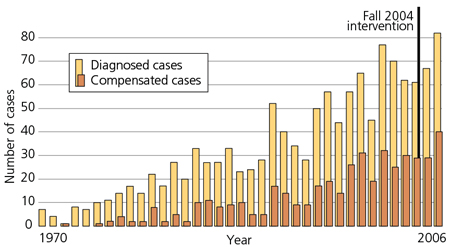Number of diagnosed mesothelioma cases and number compensated
by WorkSafeBC, BC, 1970-2006
In brief
- Mesothelioma is a rare form of cancer with a single, well-established cause: exposure to asbestos or related minerals.
- More than 80% of mesothelioma cases are likely caused by workplace exposures, and because of the long latency between exposure and disease, cases of mesothelioma are expected to peak between 2015 and 2019.
- Our research shows that less than half of individuals with mesothelioma listed in the BC Cancer Registry file a workers’ compensation claim for their disease.
Awareness campaign
- In order to increase awareness of compensation services, we worked with the BC Cancer Agency and WorkSafeBC to send a letter to all physicians of newly diagnosed mesothelioma patients.
- This letter campaign, which began in November 2004, increased compensation rates by 10% for those patients whose physicians received a letter in the years 2004 to 2006. However, our ongoing surveillance of mesothelioma cases has shown that since 2006, the intervention effect of the letter has declined. We continue to work with the BC Cancer Agency and WorkSafeBC to refine and improve this notification system.
Understanding why individuals do or do not seek compensation
- Through qualitative interviews with mesothelioma patients, their family members, and physicians, we investigated (1) the reasons why individuals do or do not seek compensation; (2) avenues for effectively communicating information to them about occupational disease and compensation; and (3) why physicians may or may not provide advice or recommendations to patients on occupational disease and compensation.
- We found that individuals with mesothelioma and their families rely heavily on physicians as trusted sources of information for both medical and compensation-related issues and that the process for filing a compensation claim is perceived as a complicated and uncertain bureaucratic procedure.
- A random sample of physicians who would typically deal with occupational diseases tended to agree that they were unfamiliar with the workers’ compensation system, that helping individuals with mesothelioma seek compensation is time consuming, and that the compensation process is a barrier for their patients.
- We recommend increasing awareness of occupational exposures and related diseases, and workers’ compensation processes, among physicians.
Learn more about our work on Mesothelioma epidemiology and prognosis
Related publications
Do patterns of past asbestos use and production reflect current geographic variations of cancer risk? Mesothelioma in Ontario and British Columbia, Canada
Journal article
Slavik C, Demers PA, Tamburic L, McLeod CB.
Cancer Causes Control. 2023 Feb 2. doi: 10.1007/s10552-023-01672-4. Online ahead of print.
Mesothelioma Surveillance and Prognosis in BC
Research brief
Based on: Demers P, McLeod C. Mesothelioma Epidemiology and Prognosis. Final Report to WorkSafeBC. Vancouver, BC: Partnership for Work, Health and Safety; July 2020.
Read the results of the Ontario portion of this study: Mesothelioma: Epidemiology and prognosis
The Burden of Asbestos-Related Disease in British Columbia: Final Workshop Report
Report [PDF: 206 KB]
WorkSafeBC-CHSPR Research Partnership. Vancouver, BC: Centre for Health Services and Policy Research; 2011.
Surveillance of mesothelioma and workers’ compensation in British Columbia, Canada
Journal article
Kirkham TL, Koehoorn MW, McLeod CB, Demers PA. Occupational and Environmental Medicine. 2011 Jan;68(1):30-5.
Research summary [472 KB]
Funding
WorkSafeBC and the AREA Fund.
